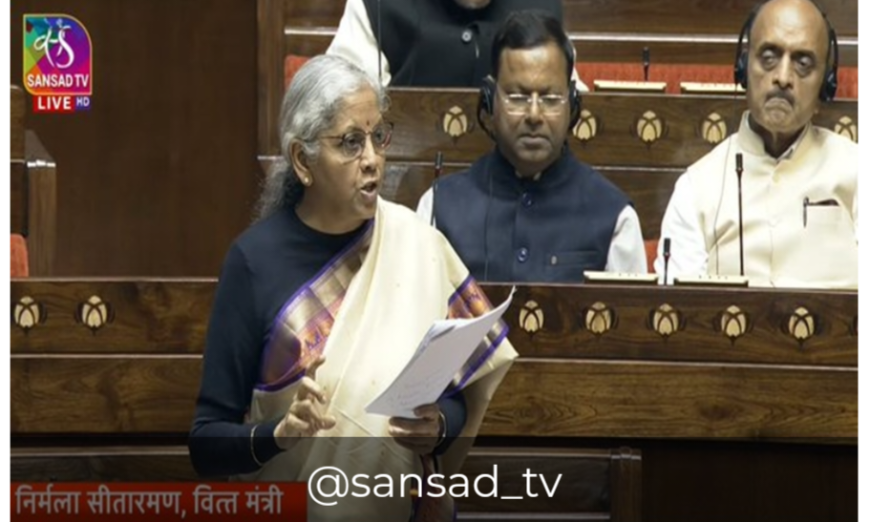Updated, Feb. 08. 2024. 8.39 PM.
The government on Thursday (08th February 2024)tabled a White Paper on the Indian economy in Parliament asserting that every challenge of the pre-2014 era was overcome through its economic management and governance with the right policies, true intentions, and appropriate decisions.
The White Paper tabled by Union Finance Minister Nirmala Sitharaman in both Houses stated that these have placed the country on a resolute path of sustained high growth. The White paper stated that in 2014 when the Narendra Modi government came to power, the economy was in a fragile state and public finances were in bad shape. It said, there was economic mismanagement and financial indiscipline as well as widespread corruption due to which there was a crisis. In the paper, the government said, at that time, the need of the hour was to give hope to the people to attract investments and build support for the much-needed reforms. It underlined that the government believed in nation-first and not in scoring political points.
It further said that now the economy has been stabilised and is on a recovery and growth path as in the last ten years, the government has successfully overcome the challenges left behind by the previous government. Highlighting the situation in pre-2014, it mentioned that the UPA Government failed miserably to facilitate economic activities and created hurdles that held back the economy.
The 59-page document said, the previous Congress-led government demonstrated that it is easier to hurt the economy than to help it. It observed that the past regime inherited a healthy economy and bequeathed an enfeebled one to the Modi government.
The paper underlined that the Congress-led government basked in the after-glory of the lagged effects of the reforms of the Vajpayee-led NDA government and benign global conditions and proceeded to exploit the resultant fast economic growth for narrow political purposes. The result was a mountain of bad loans, a high fiscal deficit, a high current account deficit and double-digit inflation for five years which hit the pockets of many Indians.
The White Paper noted that the banking crisis was one of the most important and infamous legacies of the UPA government. It added that poor policy planning and execution also resulted in large unspent funds for many social sector schemes during the UPA years, which in turn crippled the effectiveness of the Government’s schemes. The UPA government’s decade of governance was marked by policy misadventures and scams including non-transparent auction of public resources, the spectre of retrospective taxation, unsustainable demand stimulus and ill-targeted subsidies and reckless lending by the banking sector with undertones of favouritism.
In the UPA government, decision-making came to a standstill due to corruption and scandals in defence, compromising defence preparedness. The government delayed the acquisition of artillery and anti-aircraft guns, fighters, submarines, night fighting gear and a host of equipment upgrades.
The White Paper added that the Narendra Modi government, armed with political and policy stability, recognised the need to make tough decisions for the greater economic good. The Centre said rather than employing quick fixes, it undertook bold reforms to nurture the coming decades of economic performance. The paper highlighted that the Government, unlike its predecessor, invested in the foundations of the economy along with building a sturdy superstructure.
The country is now among the top five economies, making the third-highest contribution to global growth every year. India is at its best in terms of content, consensus and logistics, providing acceptable solutions to global problems. Unlike double-digit inflation during the UPA rule, now inflation has been brought down to a little over five per cent. The country has record foreign exchange reserves of over 620 billion US dollars. The White Paper said that now, the wheels of the virtuous cycle of investment, growth, employment and entrepreneurship, and savings are leading to more investments and productivity.
The objectives of the White Paper are to apprise Members of the Parliament and the people of the country, of the nature and extent of governance, and economic and fiscal crises that were bequeathed on this government when it assumed office in 2014. It also informs about the policies and measures that the current government took to restore the health of the economy and make it vigorous and capable of fulfilling the growth aspirations of the people in the present and the Amrit Kaal.

